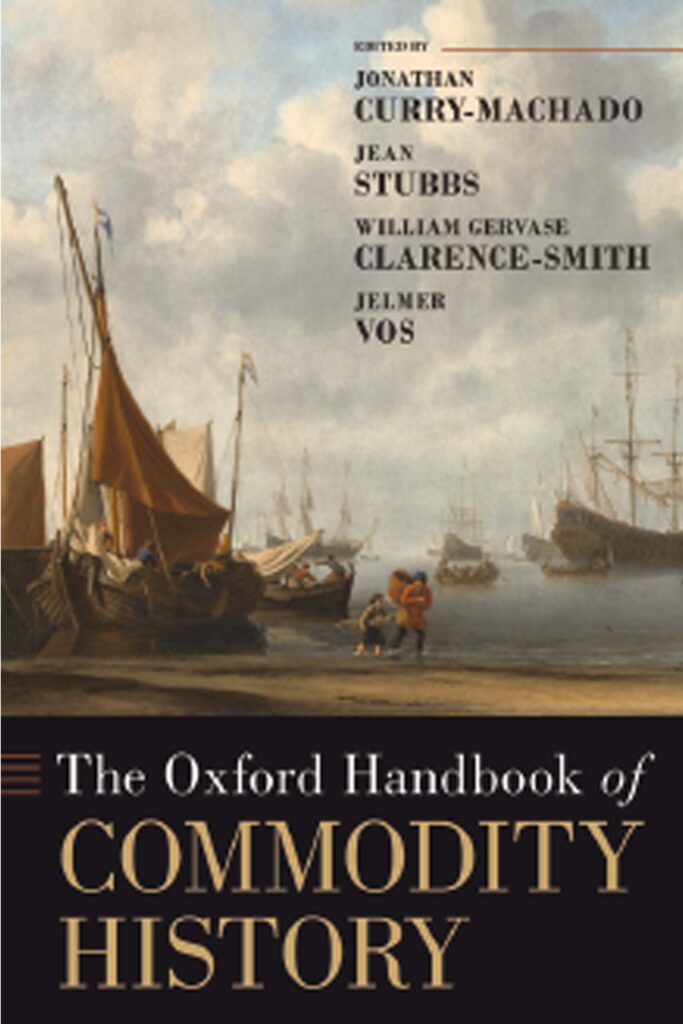Edited by Jonathan Curry-Machado, Jean Stubbs, William Gervase Clarence-Smith and Jelmer Vos. Published by Oxford University Press, 2024.
Commodities provide a lens through which local and global histories can be understood and written. The study of commodity history follows these goods as they make their way from land and water through processing and trade to eventual consumption. It is a fast-developing field with collaborative, comparative and interdisciplinary research, with new information technologies becoming increasingly important. Although many individual researchers continue to focus on particular commodities and regions, they often do so in partnership with others working on different areas and employing a range of theoretical and methodological approaches, placing commodity history at the forefront of local and global historical analysis.
This Oxford Handbook features contributions from scholars involved in these developments across a reange of countries and linguistic regions. They discuss the state of the art in their fields, draw on their own work, and signal lacunae for future research. Each of its chapters focuses on an important thematic area within commodities history. Taken together, the Oxford Handbook of Commodity History offers insights into the directions in which commodities history is heading, and the multiple ways in which it can contribute to a better understanding of the world.
The Handbook is available for purchase from OUP with a 30% discount with the attached flyer.
It is also available on-line here.
You can view video interviews with contributors to the Handbook here

CONTENTS
Curry-Machado & Stubbs on Commodity History
Part One: Approaches
Ciccantell, Smith & Topik on Commodity Chains
Ruf, Ollendorf & Uribe Leitz on Approches Filieres
Hazareesingh & Maat on Anti-commodities and Food
Bosma & Vanhaute on Commodity Frontiers
Part Two: Global Histories
Faroqhi on Early Modern Commodity Routes
Antunes & Vos on Port Cities and Commodities
Luxán Meléndez, Fiueiroa-Rego, Sanz Rozalén & Stubbs on Commodities and Imperial History
Engel on Futures Trading
Dietrich on Socialist Commodities
Part Three: Methods of Production
Marques on Mining Frontiers
Pretel on The Technological History of Global Commodities
Nadri on Plantations and Commdities
Robins on Primary Commodities and Industrial Consumers
Part Four: People and Land
Zeuske on Migration, Slavery, and Commodification
Hofmeester on Labour as a Commodity
Cottyn on Land-Rights Commodification
Fernández-Prieto on The Circuits of Knowledge
Part Five: Environments
Joseph on Territorial Mapping and Frontier Zones
Chambouleyron, Fischer & Arenz on Land Use and Commodities
Ross on Commodities, Trade, and Ecological Transformation
Brooke, Herschthal & Kaplan on Commodities and Climate – Video interview
Part Six: Commodities and Consumption
Cowie on Animals as Commodities
Madancy on Drug Histories
Zanoni on Culinary Commodities
Mullins on Historical Archaeologies of Commodities
Part Seven: Methodologies
Arabindan-Kesson on the Visual Life of Commodities
Van Erp & Bosma on Computational Methods for the History of Commodities
Clifford, MacFadyen & Castonguay on Mapping Commodity Histories
Crespo-Solana on Commodities, Interdisciplinarity, & Historical GIS
Conclusion
Clarence-Smith & Vos on a Multi-centered Approach to Commodity History
